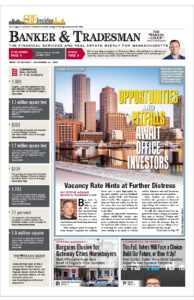
State Revenue Commissioner Geoffrey Snyder said he can’t “substantiate” claims that Boston raised taxes on tower owners who challenged their valuations. A lawsuit could be next. iStock illustration
I’m pretty sure this is one dispute State Revenue Commissioner Geoffrey Snyder won’t have the last word on.
Earlier this month, the Healey administration’s revenue chief clumsily attempted to brush off allegations by a group of Boston office building owners that they have faced retaliation from city assessors.
Their offense: Having the temerity to seek tax abatements on their office buildings, many of which are still missing tenants years after the pandemic ended.
The state’s top taxman was responding to detailed allegations put forth by Frank Bailey, a retired federal judge and president of the Pioneer New England Legal Fund.
Bailey had investigated claims by Boston building owners that they had suffered retaliation at the hands of city assessors.
Commissioner Gives the Brush-Off
In late July, Bailey summarized his findings in a letter to the state’s revenue chief. And he backed it all up with voluminous documentation spelling out what he contends is Boston’s apparent practice of hitting office property owners who appeal the city assessments with what amounts to an “additional property tax.”
However, Snyder claimed, in his letter last week, that despite the paper trail laid out by Bailey and the staff of Pioneer’s legal fund, he was unable to “substantiate” that Boston assessors had “systemically and improperly increased the assessed property values for taxpayers that appeal to the Appellate Tax Board.”
Mayor Michelle Wu, for the record, flatly denied claims, telling this newspaper soon after Bailey lodged his allegations that the building owners were misconstruing the meaning of a note next to additional assessments on some buildings’ property record cards.
“The city has started making notes in the documents so everyone is on the same page about why something has been adjusted or not adjusted,” Wu said in June. “The process of going through to the ATB can take some time, and in the meantime, sometimes the city will make adjustments despite the ongoing [ATB] dispute. Most of the time that is when there are facts in question… and we had our numbers wrong.”
Snyder also claimed confusion over the purpose of the letter from Bailey and Pioneer, saying he was unclear whether the purpose was to challenge the tax assessments on specific Boston buildings.
The state’s tax chief also declined an invitation by Bailey and Pioneer legal fund staff to sit down in person. All in all, Snyder doesn’t appear interested in launch his own review of the matter.

Scott Van Voorhis
Accusers Fire Back
Bailey wasn’t buying it and responded with a stinging letter last week.
“Because our assertions are plain, simple and readily apparent from the records we provided, we can only assume that your professed confusion about our assertions is mere bureaucratic convenience,” Bailey said.
In fact, Bailey had gone to Boston City Hall himself to look directly at the property records of building owners who say they have been hit with the added charge, which can only be seen on actual paper documents.
Bailey was accompanied by Dan Ryan, the top real estate attorney who first blew the whistle on the city’s legally dubious assessing tactic. Ryan and Bailey say the tactic appears to have been used in numerous cases, although only two downtown buildings – One Post Office Square and 125 High St. – have been publicly identified, by reporting in the Boston Business Journal.
In the typical scenario, Bailey said, city officials would initially lower the tax assessment on a particular office property.
The building owner would then file for a tax abatement, contending the city’s assessment of the property’s value was still too high given abysmal market conditions.
City officials would then allegedly respond by jacking the assessment back up to its previous value – a value which it had already acknowledged was too high in its initial assessment.
To further complicate matters, city assessing officials have only recorded their actions on paper property record cards filed at City Hall, with the additional charge not visible in the city’s online database. Unlike many Massachusetts municipalities, Boston doesn’t make its property record cards available online.
Given the response from the state’s revenue chief, Bailey said he is now in talks with various Boston office building owners about a potential lawsuit.
“My hope is that the [state revenue] commissioner will undertake an investigation of this and direct the assessor’s office in Boston to cease and desist,” Bailey told me. “My optimism for that result is pretty quickly disappearing.”
Scott Van Voorhis is Banker & Tradesman’s columnist and publisher of the Contrarian Boston newsletter; opinions expressed are his own. He may be reached at sbvanvoorhis@hotmail.com.






